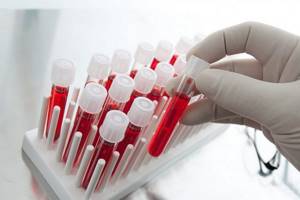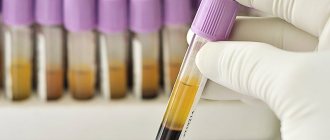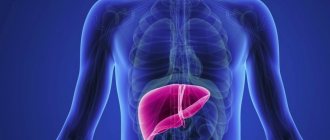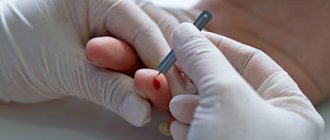You are a nutritionist or nutrition consultant who often gets asked by clients to help them lose weight. As a specialist, you understand that excess weight can have many causes, and often they are combined with each other or are codependent. Your task is to find these causes, and not just fight the consequences. Unfortunately, excess body weight is not always the result of poor nutrition and lack of adequate physical activity. In some cases, concomitant diseases or syndromes are to blame, without correction of which you can’t really count on stable weight loss.
If, after communicating with the client, you realized that it is not only a matter of diet and a passive lifestyle, then it is better to prescribe additional examinations and tests. They will facilitate diagnosis and help find the root causes of excess weight, which will greatly simplify the process of getting rid of extra pounds and increase the likelihood of stabilizing body weight for many years.
Today, experts from the school of dietetics at the Wellness Consulting Academy will talk about tests and examinations that should be recommended to clients before losing weight, as well as about health problems that affect weight...
Detailed description of the study
Obesity is a chronic disease associated with metabolic disorders, which is manifested by increased accumulation of adipose tissue in the body. The progressive accumulation of fats in organs and tissues leads to numerous serious consequences: cardiovascular diseases (atherosclerosis, hypertension, coronary heart disease, strokes), type 2 diabetes mellitus, destruction of bones and joints due to increased load on them with excess body weight, infertility, increased risk of developing cancer.
The presence of obesity is assessed by assessing the body mass index (BMI), that is, the ratio of a person's weight and height. The diagnosis of obesity is made with a BMI>30. Radiation diagnostic methods are also used - magnetic resonance imaging.
Among the causes of obesity, two large groups can be distinguished - acquired and congenital, that is, genetically determined. The first group includes the following reasons: overeating, low physical activity, endocrine diseases (hypothyroidism, pituitary tumors, Cushing's syndrome), taking certain medications (psychotropic drugs, glucocorticoids, tyrosol, etc.).
Genetic predisposition to obesity in both men and women increases the risk of developing various obesity-related diseases at a young age.
The Gemotest laboratory determines mutations in genes that determine the tendency to obesity:
The ADRB2 gene encodes the beta-2 adrenergic receptor, an ion channel embedded in the cell membrane. It is involved in the regulation of glucose metabolism - its consumption and storage, including in the form of fat deposits. A mutation in this gene increases the risk of developing metabolic syndrome in men, hypertension due to diabetes mellitus.
The MC4R gene encodes the neuronal melanocortin receptor, which regulates feeding behavior (suppresses appetite) and energy balance. Its binding to the hormone melanocortin causes a feeling of fullness. Mutations in the MC4R gene lead to a decrease or complete loss of receptor activity. A person’s feeling of satiety is disturbed, and an uncontrolled appetite may appear. Mutations in the MC4R gene occur in approximately 6% of people with severe obesity.
The LEPR gene encodes the transmembrane receptor for the hormone leptin (LEP), which is present on fat cells. It regulates the mass of adipose tissue and energy expenditure both in adipose tissue cells and in almost all other organs. Mutation of LEPR results in changes in receptor activity. In this case, there is an increased tendency to obesity, impaired glucose tolerance and the development of type 2 diabetes mellitus against its background, as well as the development of atherosclerosis.
The POMC gene encodes the protein proopiomelanocortin (POMC), a precursor hormone produced in the anterior pituitary gland. The POMC protein breaks down various other hormones - ACTH (adrenocorticotropic hormone), beta-lipotropin, alpha-melanocyte-stimulating hormone and others to prevent their excessive action. When a mutation occurs, the hormonal balance is disrupted, leading to the development of severe forms of obesity with early onset.
Composition of the complex:
- Beta 2 adrenergic receptor ADRB2: Gly16Arg (G16R)
- Melanocortin receptor (type 4) MC4R: Val103Ile
- Leptin receptor LEPR: Gln223Arg (Q223R)
- Leptin receptor LEPR: Lys109Arg (K109R)
- Leptin receptor LEPR: Lys656Asn (K656N)
- Proopiomelanocortin POMC: Arg236Gly (R236G)
What tests should you take before losing weight?

Basic knowledge of endocrinology, acquired in courses for nutritionists, will allow you to suspect certain disorders based on the symptoms described. However, in matters related to health, there is no need to guess, so it is better to prescribe the following tests to the client:
- A complete blood test showing the number of leukocytes, lymphocytes, monocytes, red blood cells, platelets, ESR and hemoglobin level. It can be used to judge the general state of a person’s health, make a preliminary diagnosis of anemia, suspect a tendency to thrombosis and allergic reactions, and see the presence of inflammatory, bacterial or viral processes.
- Biochemical blood test, in particular, liver and kidney complex, study of pancreatic functions. It will show the level of fat metabolism in the body, total cholesterol and lipoprotein levels, the amount of insulin, leptin and C-peptides in the blood, and much more. Biochemistry can be used to judge the functioning of the kidneys, liver and pancreas.
- A blood sugar test is the primary diagnosis of diabetes. In case of elevated fasting glucose levels, a glucose tolerance test is additionally prescribed, a dynamic blood sugar test is performed (fasting and after meals), an insulin level test, and others.
- Enzymatic analysis of the pancreas to study the amount of secreted enzymes (pancreatic and alpha-amylase, lipase). Its results allow us to judge the efficiency of food digestion in the body.
- Analysis of thyroid hormones (T3, T4, TSH and others). Allows you to suspect hypothyroidism or hyperthyroidism.
- Analysis for glycated hemoglobin, which shows the average blood sugar level over the last 6-8 weeks (normally it should be up to 6%).
- Analysis for the hormone cortisol, which is involved in the formation and accumulation of abdominal fat. Activation of cortisol occurs during periods of stress, so after serious stressful situations it is necessary to take it.
- Analysis for sex hormones (only women are taken!), namely: prolactin, estradiol, progesterone and oxyprogesterone, testosterone. These tests in women of reproductive age are taken on certain days of the menstrual cycle.
- A general urine test that will show the condition of the genitourinary system and kidneys.
After these tests, the endocrinologist (gynecologist-endocrinologist) and nutritionist may prescribe additional studies that are needed for a more accurate diagnosis and prescribing appropriate treatment.
References
- Contopoulos-Ioannidis DG, Manoli EN, Ioannidis JP. Meta-analysis of the association of beta2adrenergic receptor polymorphisms with asthma phenotypes. J Allergy Clin Immunol. 2005 May;115(5):963-72.
- Israel E et al. The effect of polymorphisms of the beta(2)-adrenergic receptor on the response to regular use of albuterol in asthma. Am J Respir Crit Care Med. 2000 Jul;162(1):75-80.
- Bengtsson K et al. Beta(2)-adrenergic receptor gene variation and hypertension in subjects with type 2 diabetes. Hypertension. 2001 May;37(5):1303-8.
- Dallongeville, J., Helbecque, N., Cottel, D., Amouyel, P., Meirhaeghe, A. The gly16-arg16 and gln27-glu27 polymorphisms of beta-2-adrenergic receptor are associated with metabolic syndrome in men. J. Clin. Endocr. Metab. 88:4862-4866, 2003.
- Farooqi IS,et al. Clinical spectrum of obesity and mutations in the melanocortin 4 receptor gene. N Engl J Med 2003; 348: 1085−1095.
- Lubrano-Berthelier C. et al., Melanocortin 4 receptor mutations in a large cohort of severely obese adults: prevalence, functional classification, genotype-phenotype relationship, and lack of association with binge eating, J Clin Endocrinol Metab. 2006.
- Considine, RV, Considine, EL, Williams, CJ, Hyde, TM, Caro, JF The hypothalamic leptin receptor in humans: identification of incidental sequence polymorphisms and absence of the db/db mouse and fa/fa rat mutations. Diabetes 45:992-994, 1996.
- Wauters, M., Mertens, I., Rankinen, T., Chagnon, M., Bouchard, C., Van Gaal, L. Leptin receptor gene polymorphisms are associated with insulin in obese women with impaired glucose tolerance. J. Clin. Endocr. Metab. 86: 3227-3232, 2001.
- Challis, BG, Pritchard, LE, Creemers, JWM, Delplanque, J., Keogh, JM, Luan, J., Wareham, NJ, Yeo, GSH, Bhattacharyya, S., Froguel, P., White, A., Farooqi , IS, O'Rahilly, S. A missense mutation disrupting a dibasic prohormone processing site in pro-opiomelanocortin (POMC) increases susceptibility to early-onset obesity through a novel molecular mechanism. Hum. Molec. Genet. 11: 1997-2004, 2002.
Biochemical blood test
Overweight patients need to monitor lipid and cholesterol levels. With obesity, there is an increased risk of deposition of atherosclerotic plaques in the vessels, leading to insufficient blood supply (ischemia) to organs. The concentration of apolipoprotein B, a carrier substance for “bad” cholesterol, which causes heart disease, is measured.
The level of apolipoprotein A1, which clears the walls of blood vessels of plaque, is also measured. A change in its concentration indicates liver disease, bile stagnation and hereditary diseases leading to weight gain.
Bowel cancer test
If all previous studies were performed on blood, then the biomaterial for this analysis is feces. A stool occult blood test is an important test for determining the early stage of bowel cancer. An alternative to this test is a colonoscopy - a procedure that will clearly determine the presence of a malignant neoplasm. However, many men refuse it, not knowing that there is an easier option for primary diagnosis.
It is advisable to carry out the study on men after 35 years of age at least once every two years, but preferably annually. Particular attention should be paid to men who lead a sedentary lifestyle, have an unbalanced diet and drink alcohol. All of the above tests are considered the “gold standard” for diagnosing diseases in men. In modern conditions, when medical laboratory offices are accessible to everyone and you can get tested without even leaving your home - by calling an on-site laboratory service, getting tested has become very convenient. All of the above studies can be completed even in one day and you can immediately receive advice and a specialist’s opinion. 1-2 days a year (and sometimes just a few hours) devoted to examination are of great importance for men's health, do not forget about it!
Hormonal screening
A testosterone test is indicated for young men, since after reaching the age of 30, the production of the male hormone, testosterone, begins to decrease by 1% per year, which determines the risks of male infertility, erectile dysfunction, diabetes and other diseases.
The test is prescribed if a man has problems with skin and excess weight, there is a decrease in libido, or there are difficulties with conceiving. Hormone levels can change due to stress, disease development, or lifestyle changes, so doctors recommend monitoring hormonal status at any age.
Causes of obesity
The most common causes of obesity are:
- Excessive and unhealthy diet (abuse of fast food, baked goods and sweets, etc.). Malnutrition means high calorie content of food, its saturation with fats, sugars, salt and low content of fiber, as well as vitamins and minerals.
- Physical inactivity, sedentary work and lifestyle.
- Diseases of the endocrine system (diseases of the thyroid gland, adrenal glands, pituitary gland, ovaries).
If you cannot cope with obesity on your own, you understand that you have lost control over your own weight, you should immediately consult a doctor, since the cause may require not only a change in your daily routine and diet, but also treatment by an endocrinologist.
Blood tests often help to correctly determine the cause of obesity, thanks to which you can not waste time on futile attempts to regain your previous weight with the help of strict diets, but immediately begin effective treatment.
Test for prostate cancer - PSA
It stands for prostate specific antigen and is a tumor marker that determines the risk of developing prostate cancer. Prostate cancer is one of the main causes of death in men among other cancers, so the study should be carried out regularly from the age of 35-40 years.
This test must be taken by all healthy men, even if they feel ideal. Prostate tumors are insidious and can develop quickly and asymptomatically. A simple laboratory examination will detect the disease at an early stage, when it is possible to cure.









